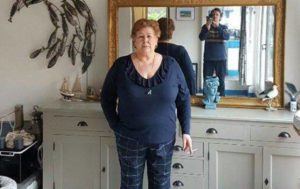PARIS >> Frenchwoman Jeanne Pouchain has an unusual problem. She is officially dead. For three years she has been trying to prove that she is alive.
The 58-year-old woman says she lives in constant fear, not daring to leave home in the village of São José, in the Loire region. The authorities seized her car because of an unpaid debt that she disputes and which is at the heart of her problems. She fears that the family furniture will be next.
Pouchain’s status prevented her and her husband, who is her legal beneficiary together with her son, from using her joint bank account. Being declared dead deprived her of other essential amenities.
“I don’t exist anymore,” said Pouchain by phone. “I don’t do anything … I sit on the porch and write.” She called the situation “macabre”.
Pouchain’s status as deceased is the result of a decision by the Lyon court in 2017 that found her dead, although no death certificate has been produced. The decision was made at the end of a legal dispute with an employee of the former Pouchain cleaning company, who was seeking compensation after losing her job 20 years ago.
But the initial complaint in France’s Prudhomme workers’ court failed, falling on Pouchain, whose lawyer says his company had no responsibility for the dismissal. A series of legal procedures, decisions and appeals followed until the Court of Cassation, France’s highest court, which ruled the case outside its domain, said Pouchain and his lawyer, Sylvain Cormier.
According to Pouchain and his lawyer, snowball judicial errors ended with the 2017 decision by the Lyon Court of Appeals that Pouchain was not among the living. The legal imbroglio is all strange because, Pouchain maintained, neither she nor her relatives received a summons to the hearing.
Pouchain’s husband and son were ordered to pay 14,000 euros ($ 17,000) to the former employee.
Cormier, his lawyer, filed an unusual motion last Monday to invalidate the 2017 decision by the Lyon appeals court due to a “serious error” by the judges. He said he had never dealt with such a “crazy” case.
“At first, I had a hard time believing in my client,” he said.
Pouchain says he cannot forgive the former employee for his situation, but does not identify the woman. The former employee’s lawyer did not respond to several requests for comment.
Cormier points the finger at the judges and his “extreme reticence to repair his mistake”.
“When a mistake is so big, it is difficult to admit,” he said.
Pouchain remains stubbornly hopeful that his attorney’s attempt to overturn the trial will succeed.
“It’s my last chance to get my life back,” she said.
